It is important as a mentor trainer to help your mentors understand the needs of novice teachers. Watch Advice for New Teachers from Other Beginning Teachers with your mentors and discuss the practical insights from these beginning teachers. How can these insights be used?
To use The First Year Matters book more effectively, the video The First Year Matters: Being Mentored in Action, and the new e-book titled Maintaining Your Balance (under the BOOKS tab on this web site), will assist you.
Review the COURSES tab to learn about opportunities for professional learned related to mentoring.
The other videos in this category are organized into two sub categories:
1) Coaching Strategies includes six videos that refer to how to use The First Year Matters book pages effectively.
2) Novice Teacher Reflections includes six videos that focus on life skills.
These short videos can be used in face to face or on-line training sessions. Design the best mentor training program possible by using these practical videos.
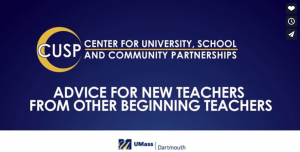 | Advice for New Teachers from Other Beginning Teachers Novice teachers share their perspectives and suggestions that would be the biggest help for other beginners. Prompts: What top two ideas were most meaningful to you? What surprised you in this video? What would you do about conflicting advice? |
 | The First Year Matters: Being Mentored in Action Beginning teachers share how they use The First Year Matters book effectively. Prompts: What are some themes that emerged that novices shared? How does this book support novice teacher evaluation? What did you notice about how they shared? |
 | Using The First Year Matters: Being Mentored in Action Novice teachers share how The First Years Matter helps them to be more effective teachers. Prompt: List three things you heard in this video that help novice teachers enhance their teaching. |
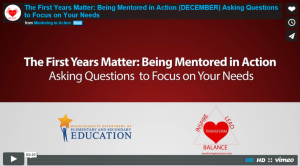 | Coaching Strategy 1: Asking Questions to Focus Your Needs A professional coach highlights the importance of a novice teacher asking questions in a mentoring relationship. Pages 25, 49, 71 and at the beginning of each chapter in Mentoring in Action: A Month by Month Curriculum provide sample questions for mentors. Pages 18, 42, 66, and at the beginning of each chapter in The First Year Matters provide sample questions for novice teachers. Prompt: How can questions engage a novice teacher? |
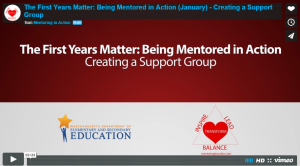 | Coaching Strategy 2: Creating a Support Group A professional coach encourages novice teachers to support themselves by creating opportunities to share in groups. Page 9 in Mentoring in Action: A Month by Month Curriculum introduces the idea of “group mentoring” in Expanding the One-One Model. Page 24 and at the beginning of each chapter in The First Year Matters there is a template for leading a new teacher support group. Prompt: How does a support group provide an opportunity for novice teachers to improve their practice? |
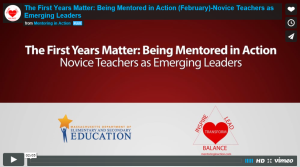 | Coaching Strategy 3: Novice Teachers as Emerging Leaders A professional coach encourages novice teachers to take on leadership roles. Pages 235, 249, 252, 258, 267, and 271, in Mentoring in Action: A Month by Month Curriculum introduce activities that could promote teacher leadership. Pages 1-10 in The First Year Matters provide an overview of the way this book promotes the novice teacher as a leader in the induction process. Prompt: Why is it important to promote teacher leadership at the beginning of a teacher’s career? ADD PDF about group mentoring |
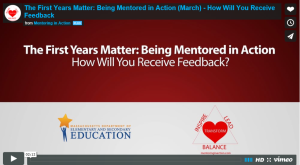 | Coaching Strategy 4: How Will You Receive Feedback? A professional coach discusses ways feedback can be received in mentoring relationships. Page 185 in Mentoring in Action: A Month by Month Curriculumprovides an overview for feedback. Page 188 and the March Chapter in The First Year Mattersprovide and overview for thinking about feedback from a novice teacher’s perspective. Prompt: Why should a mentor discuss feedback options with a novice teacher? |
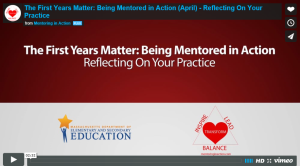 | Coaching Strategy 5: Reflecting On Your Practice A professional coach shares ways a novice teacher can integrate reflection into teaching. At the end of each chapter inMentoring in Action: A Month by Month Curriculumreflection prompts provide structure and consistency to the reflective process. All pages in The First Year Matters encourage the novice teacher to be reflective and accountable for the induction process. The January and March chapters in both books also focus on deeper reflection. |
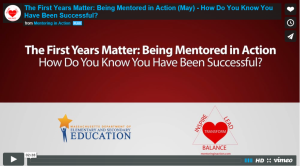 | Coaching Strategy 6: How Do You Know You Have Been Successful? A professional coach helps novice teachers assess their progress. Pages in the May and June chapters of Mentoring in Action: A Month by Month Curriculum as well as the Final Evaluation on page 263 provide scaffolding for assessing the success of the mentoring experience. The final chapters in May and June in The First Year Mattersprovide practical activities for documenting success. Prompt: Why is it important to take time to assess success for the novice teacher at the end of the year? |
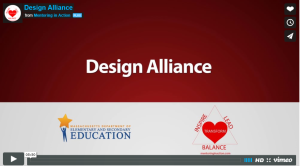 | Novice Teacher Reflection 1: Design Alliance A professional coach introduces the concept of design alliance and how it influences a novice teacher in relationship with a mentor. Prompt: What does design alliance mean to you? |
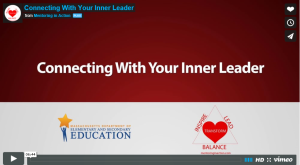 | Novice Teacher Reflection 2: Connecting With Your Inner Leader A professional coach encourages novice teachers to reflect on their own strengths. Prompt: How does this process help a novice? |
 | Novice Teacher Reflection 3: Clarifying Your Values A professional coach discusses the importance of a novice teacher understanding how values contribute to job satisfaction. Prompt: When would this process be useful? |
 | Novice Teacher Reflection 4: Are You A Victim or a Victor? A professional coach invites novices to review how they approach their teaching practice. Prompt: Why is this an important process for a novice? |
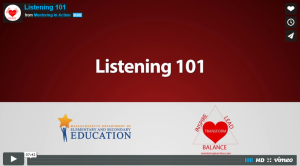 | Novice Teacher Reflection 5: Listening 101 A professional coach invites novices to reflect on their listening skills and the influence of listening on teaching. Prompt: How does listening influence a mentoring relationship? |
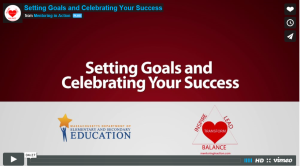 | Novice Teacher Reflection 6: Setting Goals and Celebrating Your Success A professional coach highlights the importance of reaching goals and acknowledging success. Prompt: Why is it important to take the time to celebrate? |



